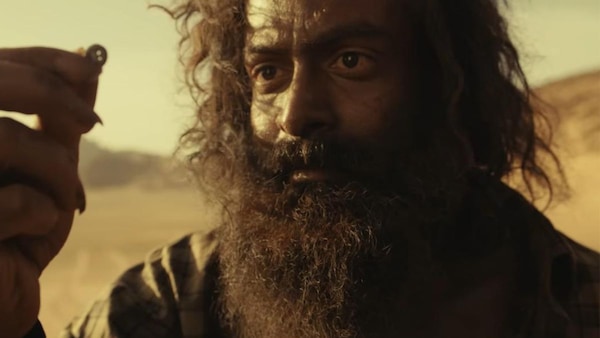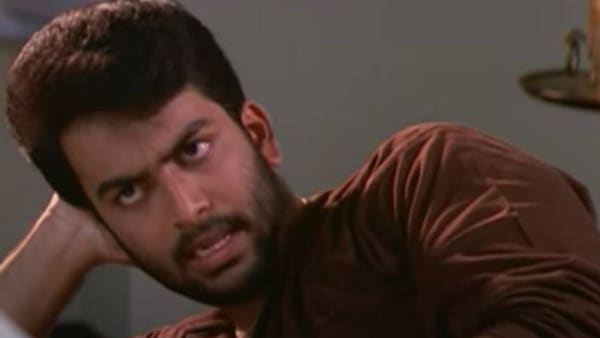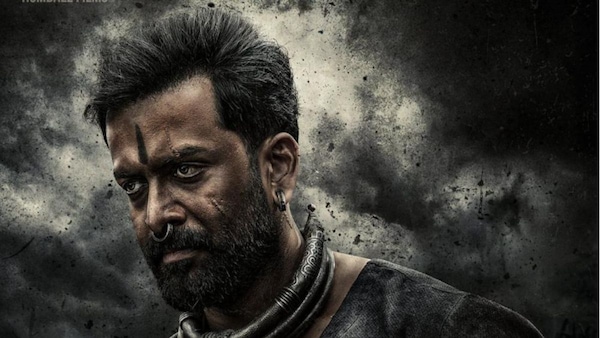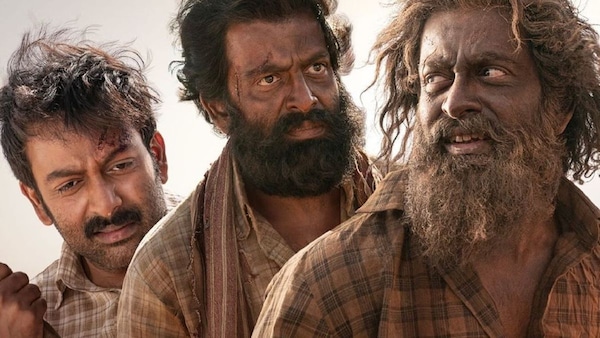The Evolution Of Prithviraj Sukumaran, From Nandanam To Aadujeevitham
In his 20-year-long career, covering roughly 120 films, Prithviraj Sukumaran has rarely won unconditional praise for a performance. But this year's Aadujeevitham is unthinkable without him.

Prithviraj as Najeeb in AadujeevithamAadujeevithamAadujeevithamAadujeevitham
Last Updated: 05.26 PM, Apr 10, 2024
IN what can be described as one of the most powerful scenes in Blessy’s Aadujeevitham, moments before he gets to flee from the Arab’s captivity, Najeeb discards his shabby robe and eagerly sits under the tap. As a few droplets of water trickle on his face, he lets out a wail, overwhelmed by the coolness even as his parched, scalded skin is stung by the sudden dampness. The staging is also crafted so that we are left in awe of the incredible physical transformation of Prithviraj Sukumaran as Najeeb. That one scene encapsulates Najeeb’s distressing three-year-old survival in confinement. For the actor, that moment can be deemed cathartic. In his two-decade-long career, covering roughly 120 films (Malayalam, Tamil, Kannada, Hindi), rarely has he won unconditional praise for a performance. Even if Najeeb is less of an internalised act and more of a committed physical makeover, one can’t undermine the actor’s absolute dedication. His voice modulation still has glitches that are more apparent in the character’s evolution. Yet Aadujeevitham is unthinkable without the actor.
Impressive debut and thereafter
Prithviraj Sukumaran’s long career has always been a rollercoaster ride. Despite an impressive debut in Nandanam (2002), the actor was unfortunate to have entered Malayalam cinema when the industry was groaning under the weight of big-budget superstar films. The actor, in his early 20s, found himself trapped in “angry young man” roles (Chakram, Sathyam, Avan Chandiyude Makan) in a string of average films. Since the narratives hardly left space for characters in his age group to thrive, Prithviraj seemed to be a fix. He was trapped in the mould of an aspiring alpha male hero and couldn't slip into ordinary characters with ease. That he required the services of a skilled director and writer to fine-tune his craft was evident. The actor hadn’t yet acquired the skills to embrace the nuances of acting. That was quite evident in how he struggled with his body language and voice modulation.

Occasionally he delivered—like the loud, playful playboy in Swapnakoodu (2003) and the hot-headed student political leader in Classmates (2006). Even then in the latter, he laboured when the character fell into an elderly getup. Interestingly despite these fallings, he has never flinched from experimenting. That also meant he played characters that belied his age and capability. The manipulative bureaucrat in Vasthavam (2006), the Anglo-Indian writer stuck in a dysfunctional family in Akale (2004), a biographical Naxal leader in Thalappavu (2008), a young Muslim fundamentalist in Deiva Namathil (2005) or film director Akbar Ahmed in Thirakkatha (2008), and a young man struggling with his roots in Punyam Aham (2010) are instances that point towards his eagerness to step out of his comfort zone. And to be fair none of his contemporaries have shown the bravura to push the envelope.
In the last decade, as cinema started evolving, leaving the arena open for a fresh crop of writers, directors, and technicians to flourish with original stories and milieus, the actor’s choice of films also improved vastly. He showed gumption in playing a closeted gay cop, in Mumbai Police (2013). Moses is pitch-perfect in the actor’s hands as his cockiness and brashness seem to sit lightly on him. And it would easily feature in the list of his top 5 performances in the last 10 years. Rest being the drunken cop who wrestles with a bruised past in Memories (2013), the Indian-born Atlanta detective who is struggling in his personal and professional life in Ivide (2015), the temperamental man-child in Ayyappanum Koshiyum (2020) and his career-best act as the gentle, emotionally scarred Joshua in Koode (2018). Yet, the actor still struggled to let go of his persona on screen.
Even when he plays alpha-male characters, despite his irrefutable screen presence, he falls behind in creating the sheer magnetism of a Mammootty or Mohanlal on screen. There is no wow factor. Maybe because he is unable to bring the necessary gravitas beyond the external bulwarks.
Venturing into other languages
Despite being one of the first actors in his generation to venture into Tamil and Hindi, the actor’s stint can best be described as “been there, done that.” Again, a quick look will reveal that his choices (Kana Kanden, Mozhi, Raavan, Kavya Thalaivan, Salaar) can’t be faulted but somehow they didn’t guarantee longevity or popularity.

The director, producer and public persona
Paradoxically the actor’s fortunes changed overnight when he shifted gears. His debut directorial Lucifer not only grossed 100 crores and overhauled Mohanlal’s career, it also instantly catapulted him to the Malayalam Director's Hall of Fame. Prithviraj gave his spin to an otherwise cliched plot, redefining the superstar projection in Malayalam cinema. A fitting fanboy tribute to Mohanlal, Lucifer is the vision of someone who loved watching Shaji Kailas-Renji Panicker-Renjith films. Despite the marathon of cliches, the fact that it all hits home proves that the director knows the pulse of the mainstream audience. In an earlier interview, he admitted that he picked up directorial skills by being an actor and observing filmmaking from close quarters.
“I think as an actor, when you direct, you strike a chord with your actors because you can understand what is happening in their personal space. When a very emotionally challenging scene is shot, you know what the ideal set-up for an actor would be. There are times you have been in front of the camera and thought, ‘I wish this were not happening right now’,” he said. Though his second directorial, Bro Daddy, a lighthearted family drama, hinged on melodrama, it still had a faithful fan following. And hands down the sequel to Lucifer remains one of the most awaited films of next year.
One of his earlier attempts at brand building has to be August Cinema, a production and distribution company he collaborated with Santosh Sivan, Shaji Nadesan, and Tamil actor Aarya. But for the audience, the company was synonymous with the actor; it also backed some fine ventures (Indian Rupee, Manjadikkuru, Anuraga Karikkin Vellam). And then he went solo with Prithviraj Production with the sci-fi horror Nine. He followed that up with nine more films, though only Driving License and Jana Gana Mana struck gold at the box office. “It is inevitable that my production banner will only associate with the kind of cinema I would like to be associated with as an actor. It was always about making cinema that is new and entertaining,” he had told this writer.
Another smart strategy was in getting the Kerala distribution rights of Petta, Bigil, 1983, Kantara, which eventually paved the way for a long-term association with Hombale Productions which also distributed Aadujeevitham in Karnataka.

On a very cursory level, he can be anointed as a brand ambassador of Malayalam cinema. He is proficient in languages, articulate, remarkably self-assured, and positions himself as an actor-director-producer who wants to ace the pan-Indian movie game. It’s a blindingly impressive resume he has put out (especially for a casual observer), and he has systematically succeeded in building himself as a brand with every interview. He unfailingly sits in every promotional media interaction and uses every jargon in the marketing lexicon to sell his films. In the 2022 Film Companion’s Filmmakers Adda, Prithvi didn’t allow the presence of Kamal Haasan and SS Rajamouli to daunt him. “Marketing is about how you lead audience perception to where you want it to be. If your claims disillusion them, then it’s a wrong marketing strategy. With the right marketing, there is no overkill,” says the actor. An actor who is still finding his feet, and a director-producer who seems to have effortlessly found his niche, that's Prithviraj Sukumaran for you.
